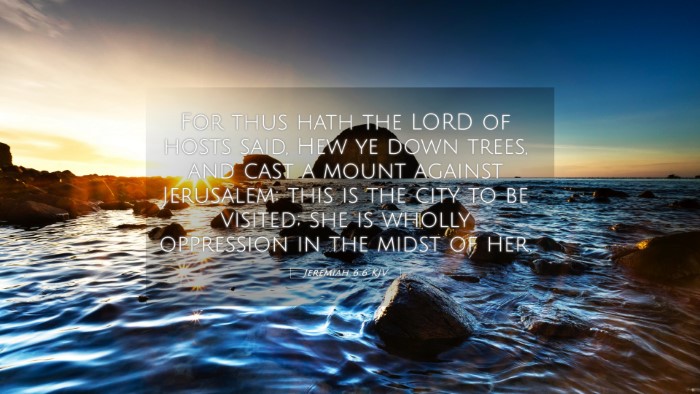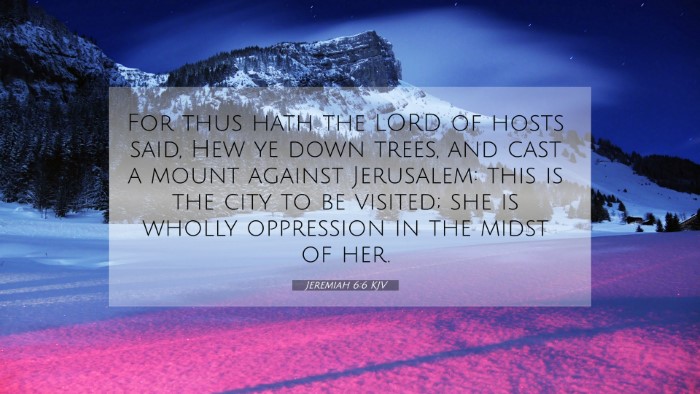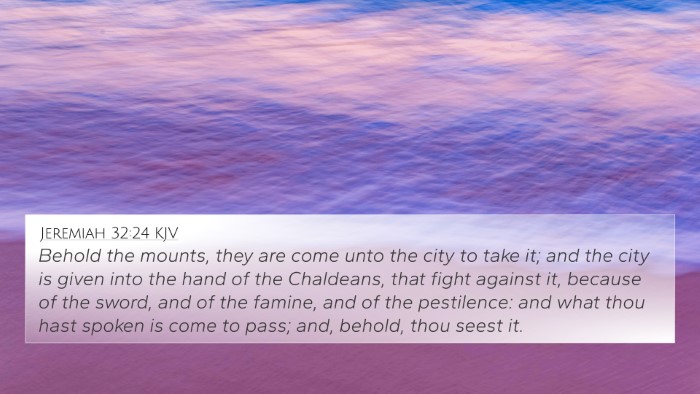Understanding Jeremiah 6:6
Jeremiah 6:6 states:
"For thus hath the Lord of hosts said, Hew ye down trees, and cast a mount against Jerusalem: this is the city to be visited; she is wholly oppression in the midst of her." (KJV)
This verse occurs in a critical context where God, through the prophet Jeremiah, is speaking to Israel about the impending judgment and destruction due to their persistent sin and rebellion.
Exegesis and Commentary Summary
The following insights summarize the interpretations from public domain commentaries such as those by Matthew Henry, Albert Barnes, and Adam Clarke.
General Overview
- Judgment Announcement: God issues a command regarding the destruction of Jerusalem, emphasizing the seriousness of the city's spiritual decline.
- Symbolism of Trees: The command to "hew down trees" serves as a symbol of removal and destruction, indicating the complete undoing of what was once robust and flourishing.
- Assurance of Divine Oversight: Despite the destructive imagery, it is crucial to recognize that God is still in control, orchestrating events to address Israel's unfaithfulness.
Detailed Commentary Insights
The following insights delve deeper into the meaning and implications of this verse:
- Matthew Henry: He emphasizes the hypocrisy of the people of Jerusalem who continue in wickedness despite being chosen as God’s people. The "mount against Jerusalem" signifies both an imminent physical attack and a spiritual warning.
- Albert Barnes: Barnes observes that the phrase "city to be visited" indicates God’s intention to judge. The oppression of the city is highlighted, showing that the social injustices and sinfulness that permeate Jerusalem cannot be overlooked.
- Adam Clarke: Clarke notes the urgency of the message, emphasizing that God's patience has worn thin. The "mount" represents the preparation for siege, a warning of the desolation that will follow if the people do not repent.
Cross-References for Jeremiah 6:6
To understand the thematic connections better, here are some important Bible cross-references that link to Jeremiah 6:6:
- Isaiah 10:33-34: This passage discusses the judgment of God on the proud and mighty.
- Lamentations 1:1: Describes the desolation of Jerusalem, paralleling the themes of judgment in Jeremiah.
- Matthew 23:37: Jesus laments over Jerusalem, indicating a continuity of judgment across both Testaments.
- Ezekiel 21:22: God's sword against the city reflects the destructiveness foretold by Jeremiah.
- Micah 3:12: Indicates the coming destruction because of injustice, a recurring theme in Jeremiah.
- Acts 7:51-53: The resistance of God's messengers mirrors the historical rejection witnessed in Jerusalem.
- Romans 2:6: Speaks about judgment according to one’s deeds, which relates to the oppressive condition of Jerusalem.
Thematic Connections in the Bible
Jeremiah 6:6 can be placed alongside various themes found throughout Scripture, demonstrating the importance of cross-referencing Biblical texts:
- Judgment and Destruction: Many verses highlight God’s judgment on nations and cities for their sins. Examples include Amos 4:12 and Zephaniah 1:4-6.
- Call to Repentance: Themes surrounding God’s prophets calling to turn from wickedness can be seen in Jonah 3:4 and 2 Chronicles 7:14.
- Restoration after Judgment: Verses like Zechariah 1:16-17 promise eventual restoration, providing hope after the warnings of destruction.
How to Use Cross-References Effectively
When studying the Bible, cross-references can be powerful tools. Here’s how to utilize a Bible cross-reference guide effectively:
- Identifying Themes: Look for common themes across different verses to gain a holistic understanding of God’s message.
- Comparative Analysis: Examine similar passages to see how they complement or contrast with each other.
- Contextual Insights: Use cross-references to see how different authors address similar issues in varied contexts.
Conclusion
In summary, Jeremiah 6:6 serves as a profound reminder of God's rightful judgment on sin and the depth of oppression present in Jerusalem during Jeremiah's time. Through thematic analysis and cross-referencing, readers can draw valuable lessons about righteousness, justice, and the overarching narrative of divine grace and judgment throughout Scripture.




